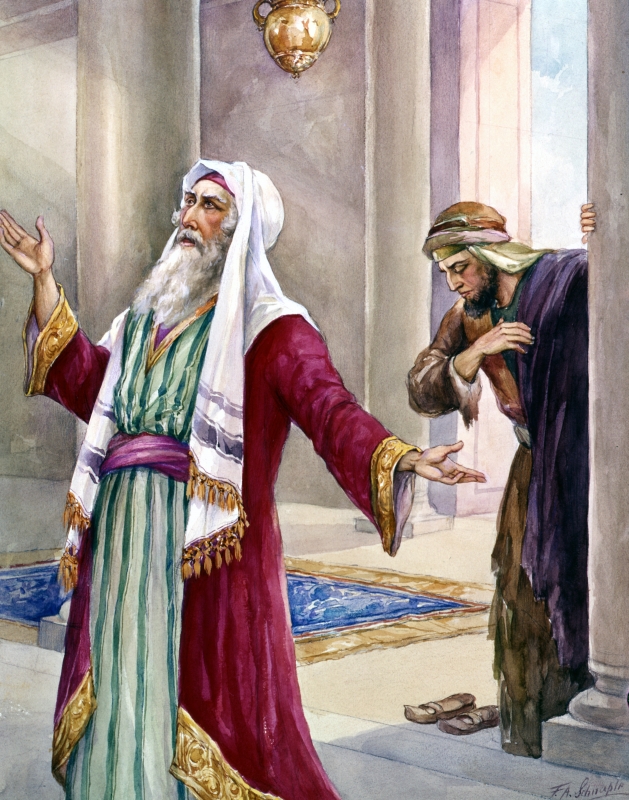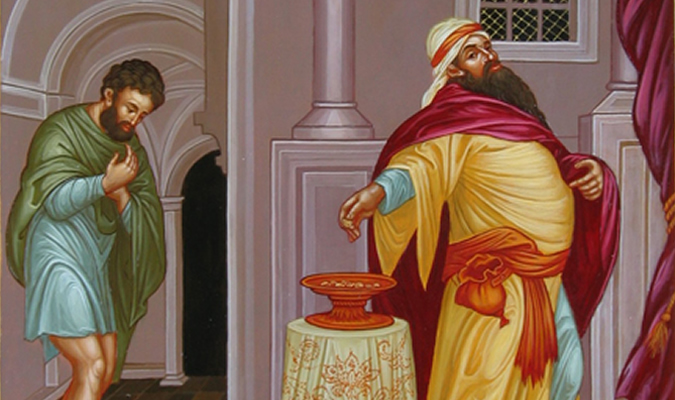Jesus then addressed this parable to those who were convinced of their own righteousness and despised everyone else. “Two people went up to the temple area to pray; one was a Pharisee and the other was a tax collector. The Pharisee took up his position and spoke this prayer to himself, ‘O God, I thank you that I am not like the rest of humanity—greedy, dishonest, adulterous—or even like this tax collector. I fast twice a week, and I pay tithes on my whole income.’ But the tax collector stood off at a distance and would not even raise his eyes to heaven but beat his breast and prayed, ‘O God, be merciful to me a sinner.’ I tell you, the latter went home justified, not the former; for everyone who exalts himself will be humbled, and the one who humbles himself will be exalted.”
– Luke 18:9-14
 When I hear this reading it’s easy for me to rehearse the same prayer. “I’m sorry God for [insert the same things I think I need to change in my life] and I’m sorry for being arrogant about [insert the same things I think I need to change in my life].” But it’s easy for me to avoid praying about the things God knows I need to change. After I’ve made my surface-level repentance, I can dwell on the people whom I judge to be Pharisees and think, “Well so-and-so needs to hear this parable. They’re so judgmental and rigid.” Sometimes I’m not even aware that I’m thinking this. It’s the sordid prayer of a pharisaical tax collector: “O God, be merciful to me a sinner… Oh, and thank you for not making me judgmental like that rigid, unloving, and arrogant Pharisee over there.”
When I hear this reading it’s easy for me to rehearse the same prayer. “I’m sorry God for [insert the same things I think I need to change in my life] and I’m sorry for being arrogant about [insert the same things I think I need to change in my life].” But it’s easy for me to avoid praying about the things God knows I need to change. After I’ve made my surface-level repentance, I can dwell on the people whom I judge to be Pharisees and think, “Well so-and-so needs to hear this parable. They’re so judgmental and rigid.” Sometimes I’m not even aware that I’m thinking this. It’s the sordid prayer of a pharisaical tax collector: “O God, be merciful to me a sinner… Oh, and thank you for not making me judgmental like that rigid, unloving, and arrogant Pharisee over there.”
We all struggle with this to varying degrees. We all have good intentions and strive to serve others and treat them with kindness, but then a conversation or interaction will elicit disdain, frustration, or anger on our part. Someone posts on Facebook about a political or religious topic that ignites uncharitable responses; there’s that co-worker who just gets under our skin no matter what they say; or there’s the family member whom we think should be more agreeable and view things the way we do. We try to respond graciously, but there’s an impulse inside that wants to ignore these people by simply dismissing them as judgmental, arrogant, and unloving. It’s discomforting how easily we can miss that we are in fact being those things of which we accuse another.
Seeing the Pharisee in ourselves
Pope Francis is essential on this matter. In The Way of Humility, Francis points to Dorotheus of Gaza, a 6th-7th century Christian, as a guide when dealing with these emotions, responses, and situations. Francis is aware that when we encounter someone we deem rigid, unkind, and arrogant, it’s easy to think of them as a Pharisee who needs to humble themselves. Using the parable above, we think, “If only this person could hear this parable and realize how arrogant and unkind they are.” Instead of accusing and judging this person, Francis asks us to reflect on how this person has revealed to us our uncharitable actions and thoughts. He quotes Dorotheus who writes:
“This person [who sees someone else as judgmental and flawed] is like a wheaten loaf that is beautiful on the outside, but when it is cut open is found to be moldy inside. They thought they were at peace, but there was a passion inside them that they did not know about or did not think important. A single word from this other person brought to light the moldiness in their heart.”
And then Francis adds one more thing (looking to Dorotheus again). He says we ought to repent for the moldiness in our heart and “be grateful to his brother for having been the cause of this improvement.” When I first heard this I immediately thought, “Be grateful?! They’re the one who needs to repent! I’m the humble one!” And thus, the moldiness of my own rigidity, arrogance, and judgmentalism is uncovered.
This is what Francis calls “the way of humility.” This way does not mean we ignore injustice or wrongdoing, but first and foremost we are called to see our own ‘moldiness’ and invite God to heal it. We may even become grateful for those individuals who have challenged us, and we may even recognize that God has placed this person in our life that we may be saved.
Take time (even if briefly) to pray over this passage and consider journaling your response:
- Read slowly Luke 18:9-14.
- When you read the description of the pharisee, who comes to mind?
- What emotions arise when you think of this person? Is there any “moldiness” that’s revealed?
- To what is the Holy Spirit calling you in response to this person?









Benjamin, you are right I am the Pharisee. Though I pray “Oh God be merciful to me a sinner” yet I continue in my Pharisaical ways. May God give me the strength to mend my ways and walk in His footsteps
Thank you for shining the torch on my conceit. I can now truly see myself as the sinner. Synchronically, I see The Holy Spirit Talking to me in all that I see
Spot on! Thanks for the great reflection this morning.
This is a continual struggle for Christians. The world tries to tell us we should remain silent when confronted with sin because if we tell someone that what they’re doing or how they’re living is sinful, then we’re just being judgmental and after all, Jesus said we’re not to judge lest we be judged ourselves. We were never called to meekly stand aside and say nothing while friends and loved ones merrily go on their way to hell. God has declared that certain acts and lifestyles are sin. He has already handed down the judgement. When you point out to the thief that his stealing is not only going to get him in trouble with the authorities, it is also a sin against God, you’re not judging him. God already said, “Do not steal.” We as Christians are called to point out sin and sinful behavior. But it must be done out of love and genuine concern for the eternal souls of the people we’re trying to reach. It must be done with gentleness and Jesus modeled that for us in His dealings with the Samaritan woman at the well. He was gentle with her, but He did not hold back. What did she say about Jesus? “Come meet a man who told me everything I ever did.” So when we come face to face to someone who is lost in sin, we have to be ever so loving and gracious as we share the gospel of salvation with them.
But there is one area where we have to careful and that’s in the area of pronouncement. Pronouncement is when we declare someone to be beyond hope. It’s when we determine that a person is beyond redemption. Read carefully fellow Christians: That is never our call to make. Pronouncement belongs to God and God alone. Only God knows what’s in a person’s heart and only God knows if someone is beyond redemption or not. Our calling is to share the gospel, and let God worry about the consequences.
Would Pope Francis say that Jesus was moldy when he judged the Pharisees as blind guides and white-washed tombs, and when he violently turned over the tables in the temple?
When does truth-telling become arrogance and judgment?
Jean, thanks for your question. I’ve been wrestling with that question, but I don’t have a clear answer. At the very least, here’s what I can say. It is not arrogant to tell the truth about injustice. It is good to judge and distinguish between good and evil.
However, we must be careful not to slide into self-righteousness when we confront a perceived injustice. Pope Francis’ reflection on St. Dorotheus puts us at a good starting point when we perceive injustice. We should pray and ask God, “Is my anger reflecting a moldiness in my heart? Am I being arrogant and self-righteous? Is God showing me grace so that I may change?” Starting here illuminates our own motives so then we can ask, “Is God calling me to confront injustice? To speak the truth about the harm another is doing?”
Nevertheless, we are still liable to being self-righteous. We may check the prayer box and tell ourselves that we asked God and God says we are right and the other person is wrong. We may even have a mixture of motives where we acknowledge our sins and moldiness while feeling called to confront injustice while feeling proud and better than others because we can acknowledge our sins and confront injustice–“More tortuous than anything is the human heart, beyond remedy; who can understand it?” (Jeremiah 17:9).
The point is that it is difficult to answer your question convincingly. We ought to respond to God as Thomas Merton did (from Thoughts in Solitude): “…and the fact that I think that I am following your will does not mean that I am actually doing so. But I believe that the desire to please you does in fact please you. And I hope I have that desire in all that I am doing. I hope that I will never do anything apart from that desire. And I know that if I do this you will lead me by the right road, though I may know nothing about it.”
I would love to hear your thoughts on this question, Jean. It’s an essential question, and I’m thankful you raised it. I’m certain I’m missing something so I’m sure you (or anyone else who wants to comment) can help me with it.